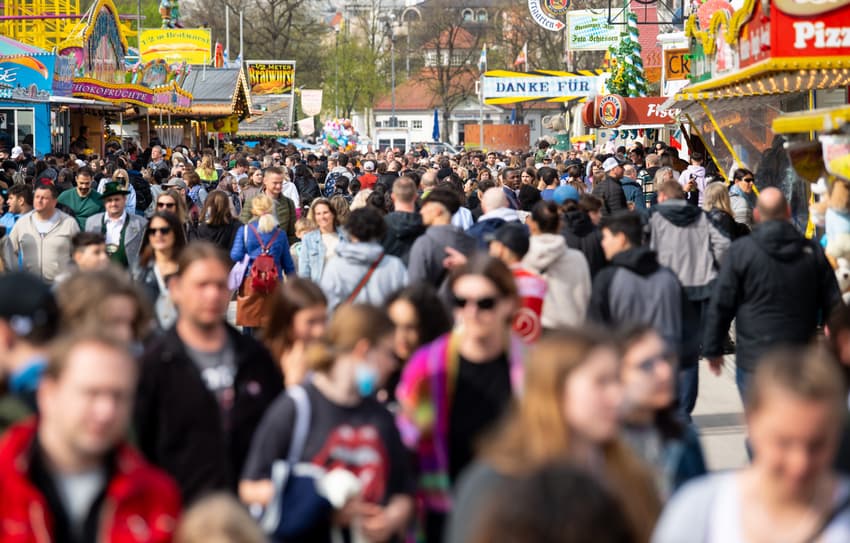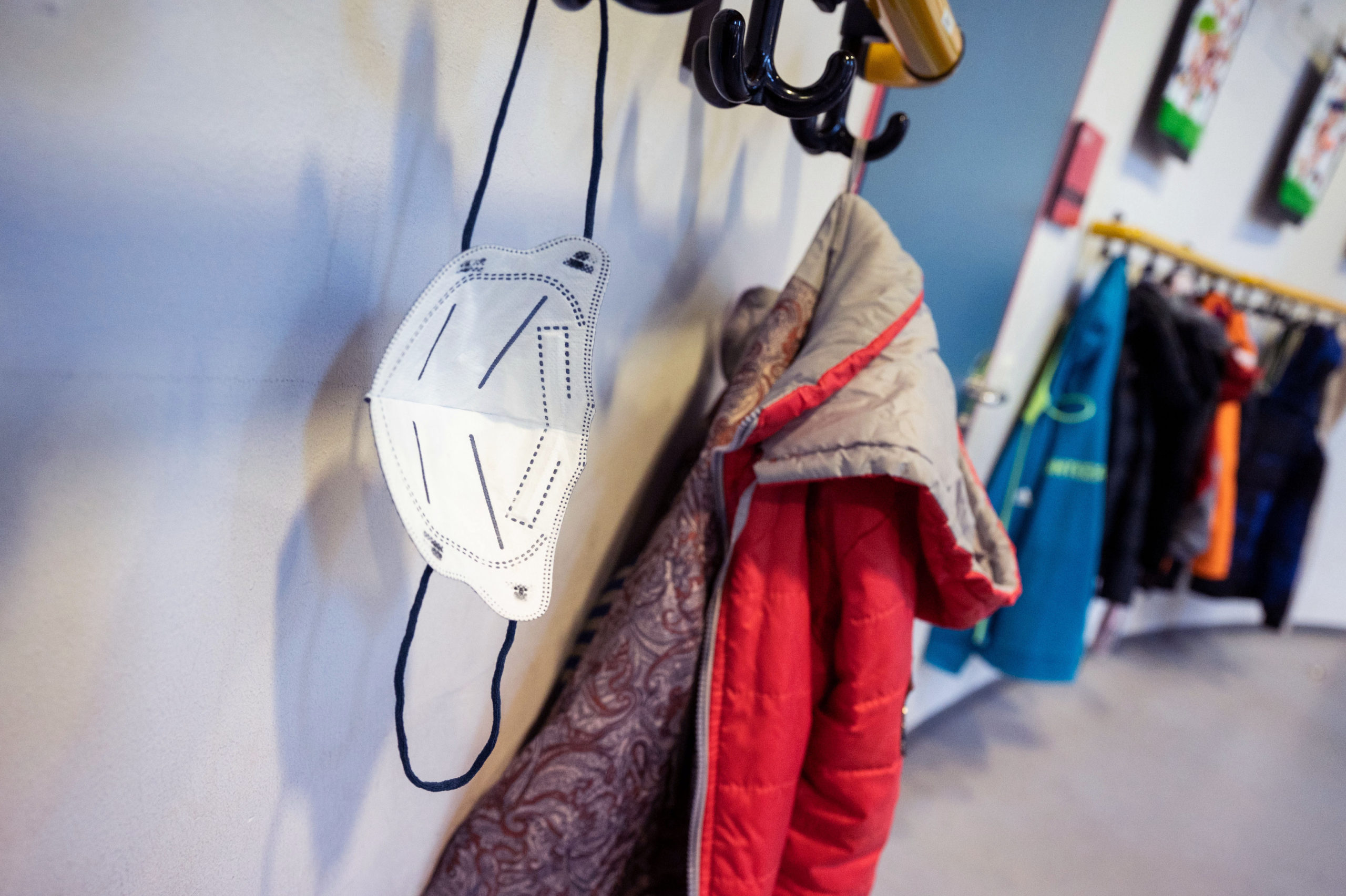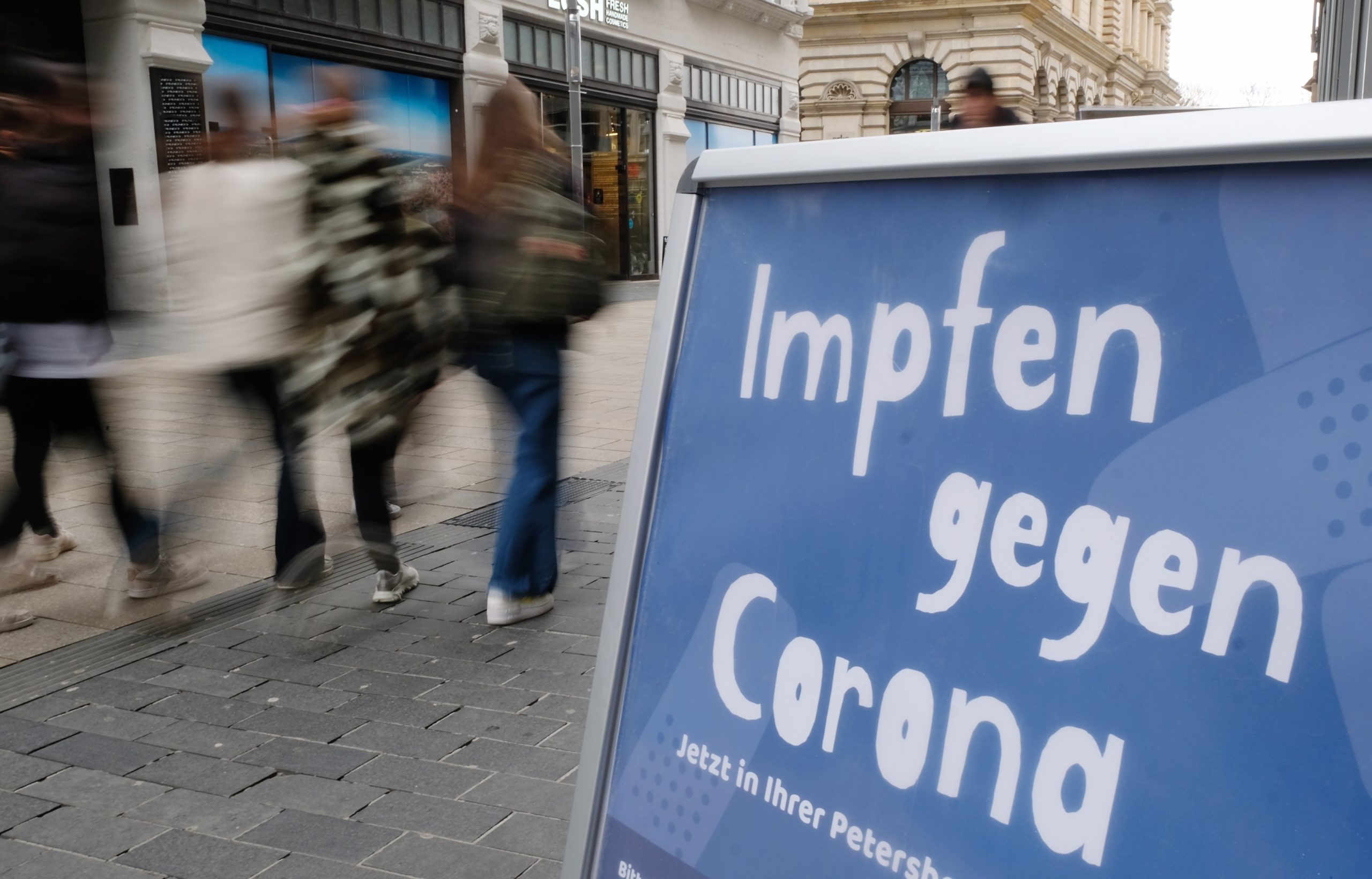EXPLAINED: The Covid rule changes in May across German states

Many Covid restrictions in Germany have been relaxed recently, but some rules remain in place. We break down what you need to know about the recent changes.
We've entered the month of May, and with it there have been some Covid rule changes in Germany.
What's happening across Germany?
Covid mask rules were heavily relaxed around the beginning of April. There is now no general obligation to wear a mask when going into supermarkets and shops.
The government and states agreed that masks should be compulsory on local public transport as well as long-distance trains and planes. They also remain in places where there are lots of vulnerable people such as hospitals, care homes and shelters for the homeless.
Independently of this, however, companies, shops and other institutions can still insist that people wear masks. Testing obligations in clinics, nursing homes, schools and daycare can also be ordered.
Nationwide, work is underway on an overhaul of isolation and quarantine rules. On April 28th, the federal and state governments agreed to reduce the isolation period to a minimum of five days, but states do not have to implement this immediately. In some regions it's already a rule.
READ ALSO: Germany to shorten mandatory Covid isolation
Here are some of the important rule changes to know about this May:
Hamburg is no longer a Covid hotspot. This means that people don't have to wear masks in places like shops anymore. Meanwhile, the 3G Covid entry rules have been dropped, and dance events no longer have the 2G-plus rule, meaning that unvaccinated people can go to a nightclub again. A mask still has to be worn in public transport as well as in hospitals and nursing homes.
It's a similar picture in Mecklenburg-Western Pomerania, which was also previously a hotspot. 2G-plus in clubs and discos and compulsory masks in cinemas and theatres is no longer in place. But masks are still needed in local transport, hospitals and similar settings.
Baden-Württemberg has waived the mask requirement at dentists, and has shortened the isolation requirement from 10 to five days.
In Bavaria, too, the basic protection measures apply, i.e. compulsory masks in local transport and in health facilities. The obligation to wear a mask will be waived at schools, where testing will also no longer be carried out. However, the Bavarian education ministry recommends the wearing of masks, especially in areas where students meet, such as in corridors and stairwells.

A mask hangs up at a school in Stuttgart. Photo: picture alliance/dpa | Marijan Murat
Meanwhile, classrooms have to be ventilated at least every 45 minutes while students and staff have to stay at home if they have any Covid or cold symptoms.
In daycare centres, testing is no longer compulsory.
Bavaria previously reduced the mandatory Covid-19 isolation period. If someone gets a positive Covid test they have to isolate for at least five days. For isolation to end on day five, the patients must be symptom-free for at least 48 hours. If not, the isolation has to continue for 48 hours at a time up to a maximum of 10 days.
Bavaria health chiefs says that final testing is not required to get out of isolation expect for medical and care staff, and after isolation, wearing an FFP2 mask indoors and reducing contact is recommended for an extra five days.
In Lower Saxony, compulsory testing and masks at schools ended last week. There is also no more testing in daycare centres. There are no general Covid restrictions in cinemas, theatres, clubs, hotels, restaurants and sports facilities - but operators can demand that people take tests or wear masks. Those who want to visit hospitals, homes and schools need a negative test certificate.
In Schleswig-Holstein, masks are still mandatory in hospitals, nursing homes and public transport. Tests must also be carried out in care facilities.
In Berlin, the obligation to test in daycare centres will be waived as of May 8th. An FFP2 mask must be worn in public transport and in doctors' surgeries. In nursing homes, visitors and residents must wear masks when leaving their rooms. There are no restrictions in hospitality, culture and sports. The isolation period for infected people is currently 10 days in Berlin (with the option to reduce it with negative tests from the seven day mark).
In Hesse, there are no restrictions aside from basic protection for doctors' surgeries, clinics and nursing homes. The isolation period for people who get Covid is now five days. Another recent change is that unvaccinated people who are contacts of someone who has tested positive no longer have to quarantine.
In Brandenburg, basic protection measures apply - such as compulsory masks in health and social care facilities and in local public transport. Testing is also compulsory for employees in health and social care facilities. Pupils and daycare centre children no longer have to be tested.
North Rhine-Westphalia also has no additional restrictions other than the basic measures regulation: mandatory masks in health and social care facilities and public transport, and mandatory testing for health and social care workers.
Thuringia has reduced the compulsory isolation for people with Covid to five days from May. A 3G rule now applies to visits to hospitals and care facilities, meaning that people have to show proof of vaccination, recovery or a negative test. Vaccinated and recovered people no longer have to provide negative proof of testing.

A sign in Leipzig says: 'vaccinate against Covid'. Photo: picture alliance/dpa/dpa-Zentralbild | Sebastian Willnow
In Bremen, the isolation requirement has been reduced from seven to five days. However, people need a negative test from a test centre or doctor to leave isolation.
In hospitals and care facilities, an FFP2 mask is compulsory for visitors over 14; previously, any medical mask was sufficient. The obligation to test in schools has been dropped, but remains in place in day-care centres.
In Saarland, health authorities have not yet been instructed to cut the isolation requirement in this state. Testing at schools has been reduced from three a week to two.
In Rhineland-Palatinate, people who have Covid and are symptom-free only have to isolate themselves for five days from May onwards. Otherwise, basic measures like compulsory masks in clinics, homes, local and long-distance transport apply.
In Saxony, the testing obligation for pupils and teachers has been lifted. Masks must still be worn on school buses, however. The mandatory isolation period in Saxony has also been cut to five days if people have no symptoms for 48 hours beforehand. No test is needed to end the quarantine. If people have symptoms or feel ill they must isolate up to a maximum of 10 days.
In Saxony-Anhalt, basic protection rules remain in place, including the mask requirement in local public transport, doctors' surgeries, hospitals and care facilities. Compulsory testing in schools was dropped last week.
Please keep in mind that this is an overview but rules can change at short notice. Double check with your regional government for more details on the rules.
Comments
See Also
We've entered the month of May, and with it there have been some Covid rule changes in Germany.
What's happening across Germany?
Covid mask rules were heavily relaxed around the beginning of April. There is now no general obligation to wear a mask when going into supermarkets and shops.
The government and states agreed that masks should be compulsory on local public transport as well as long-distance trains and planes. They also remain in places where there are lots of vulnerable people such as hospitals, care homes and shelters for the homeless.
Independently of this, however, companies, shops and other institutions can still insist that people wear masks. Testing obligations in clinics, nursing homes, schools and daycare can also be ordered.
Nationwide, work is underway on an overhaul of isolation and quarantine rules. On April 28th, the federal and state governments agreed to reduce the isolation period to a minimum of five days, but states do not have to implement this immediately. In some regions it's already a rule.
READ ALSO: Germany to shorten mandatory Covid isolation
Here are some of the important rule changes to know about this May:
Hamburg is no longer a Covid hotspot. This means that people don't have to wear masks in places like shops anymore. Meanwhile, the 3G Covid entry rules have been dropped, and dance events no longer have the 2G-plus rule, meaning that unvaccinated people can go to a nightclub again. A mask still has to be worn in public transport as well as in hospitals and nursing homes.
It's a similar picture in Mecklenburg-Western Pomerania, which was also previously a hotspot. 2G-plus in clubs and discos and compulsory masks in cinemas and theatres is no longer in place. But masks are still needed in local transport, hospitals and similar settings.
Baden-Württemberg has waived the mask requirement at dentists, and has shortened the isolation requirement from 10 to five days.
In Bavaria, too, the basic protection measures apply, i.e. compulsory masks in local transport and in health facilities. The obligation to wear a mask will be waived at schools, where testing will also no longer be carried out. However, the Bavarian education ministry recommends the wearing of masks, especially in areas where students meet, such as in corridors and stairwells.

Meanwhile, classrooms have to be ventilated at least every 45 minutes while students and staff have to stay at home if they have any Covid or cold symptoms.
In daycare centres, testing is no longer compulsory.
Bavaria previously reduced the mandatory Covid-19 isolation period. If someone gets a positive Covid test they have to isolate for at least five days. For isolation to end on day five, the patients must be symptom-free for at least 48 hours. If not, the isolation has to continue for 48 hours at a time up to a maximum of 10 days.
Bavaria health chiefs says that final testing is not required to get out of isolation expect for medical and care staff, and after isolation, wearing an FFP2 mask indoors and reducing contact is recommended for an extra five days.
In Lower Saxony, compulsory testing and masks at schools ended last week. There is also no more testing in daycare centres. There are no general Covid restrictions in cinemas, theatres, clubs, hotels, restaurants and sports facilities - but operators can demand that people take tests or wear masks. Those who want to visit hospitals, homes and schools need a negative test certificate.
In Schleswig-Holstein, masks are still mandatory in hospitals, nursing homes and public transport. Tests must also be carried out in care facilities.
In Berlin, the obligation to test in daycare centres will be waived as of May 8th. An FFP2 mask must be worn in public transport and in doctors' surgeries. In nursing homes, visitors and residents must wear masks when leaving their rooms. There are no restrictions in hospitality, culture and sports. The isolation period for infected people is currently 10 days in Berlin (with the option to reduce it with negative tests from the seven day mark).
In Hesse, there are no restrictions aside from basic protection for doctors' surgeries, clinics and nursing homes. The isolation period for people who get Covid is now five days. Another recent change is that unvaccinated people who are contacts of someone who has tested positive no longer have to quarantine.
In Brandenburg, basic protection measures apply - such as compulsory masks in health and social care facilities and in local public transport. Testing is also compulsory for employees in health and social care facilities. Pupils and daycare centre children no longer have to be tested.
North Rhine-Westphalia also has no additional restrictions other than the basic measures regulation: mandatory masks in health and social care facilities and public transport, and mandatory testing for health and social care workers.
Thuringia has reduced the compulsory isolation for people with Covid to five days from May. A 3G rule now applies to visits to hospitals and care facilities, meaning that people have to show proof of vaccination, recovery or a negative test. Vaccinated and recovered people no longer have to provide negative proof of testing.

In Bremen, the isolation requirement has been reduced from seven to five days. However, people need a negative test from a test centre or doctor to leave isolation.
In hospitals and care facilities, an FFP2 mask is compulsory for visitors over 14; previously, any medical mask was sufficient. The obligation to test in schools has been dropped, but remains in place in day-care centres.
In Saarland, health authorities have not yet been instructed to cut the isolation requirement in this state. Testing at schools has been reduced from three a week to two.
In Rhineland-Palatinate, people who have Covid and are symptom-free only have to isolate themselves for five days from May onwards. Otherwise, basic measures like compulsory masks in clinics, homes, local and long-distance transport apply.
In Saxony, the testing obligation for pupils and teachers has been lifted. Masks must still be worn on school buses, however. The mandatory isolation period in Saxony has also been cut to five days if people have no symptoms for 48 hours beforehand. No test is needed to end the quarantine. If people have symptoms or feel ill they must isolate up to a maximum of 10 days.
In Saxony-Anhalt, basic protection rules remain in place, including the mask requirement in local public transport, doctors' surgeries, hospitals and care facilities. Compulsory testing in schools was dropped last week.
Please keep in mind that this is an overview but rules can change at short notice. Double check with your regional government for more details on the rules.
Join the conversation in our comments section below. Share your own views and experience and if you have a question or suggestion for our journalists then email us at [email protected].
Please keep comments civil, constructive and on topic – and make sure to read our terms of use before getting involved.
Please log in here to leave a comment.